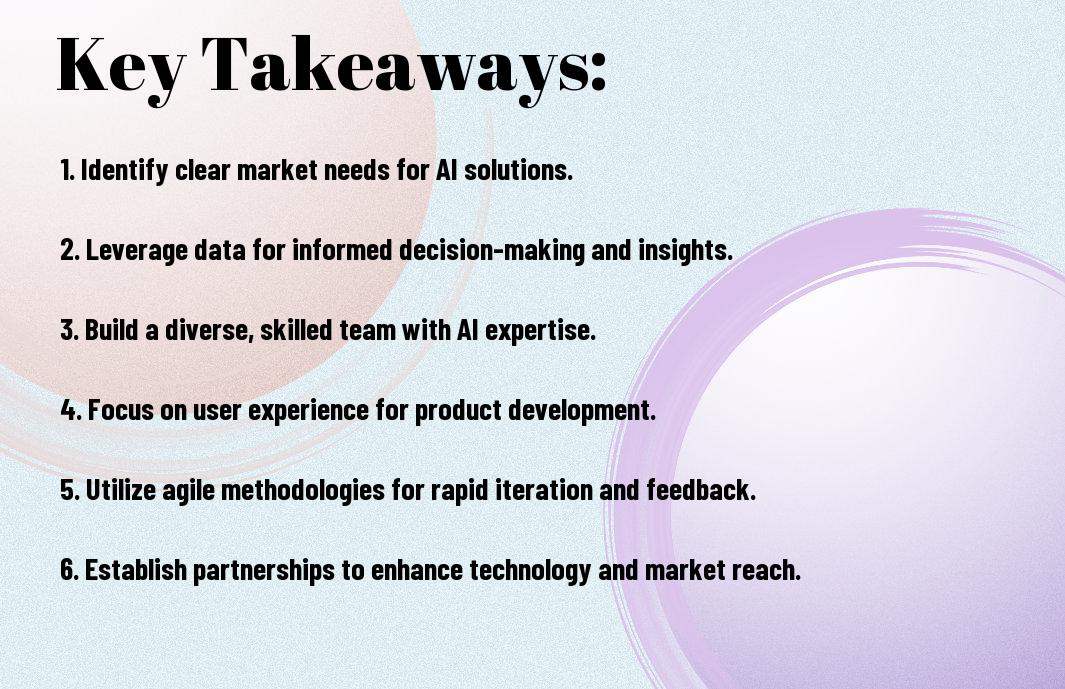As you begin on your AI startup journey, you’ll need the right tools to succeed. Your goal is to build a profitable business, and with the numerous resources available, it can be overwhelming to determine which ones are best for you. You require a comprehensive toolkit that will guide you in making informed decisions and driving growth. This post will provide you with the necessary resources needed to establish a thriving AI startup, helping you navigate the complex landscape and achieve your business objectives.
Key Takeaways:
- Developing a solid business plan is important for AI startups, including defining a unique value proposition, identifying target markets, and establishing a revenue model to ensure profitability and growth.
- Access to high-quality data is vital for training and validating AI models, and startups should prioritize data collection, cleaning, and integration to build effective AI solutions.
- Building a strong team with diverse skill sets, including AI expertise, business acumen, and industry knowledge, is necessary for driving innovation and success in AI startups.
- AI startups should focus on developing a minimum viable product (MVP) to test and refine their solutions, gather feedback from customers, and iterate towards a more comprehensive and scalable offering.
- Establishing partnerships with key stakeholders, such as investors, customers, and technology providers, can help AI startups access resources, expertise, and networks to accelerate their growth and expansion.

Market Analysis for AI Startups
For your AI startup to succeed, you need to conduct thorough market analysis to understand your target audience and identify opportunities for growth. This involves gathering data on market trends, customer needs, and competitor activity to inform your business strategy.
Identifying Viable AI Niches
Any aspiring entrepreneur knows that finding the right niche is key to success. You will need to explore various AI applications and identify areas with high demand and limited competition, where your startup can carve out a profitable niche.
Competitive Landscape Mapping
Before you launch your AI startup, you should assess the competitive landscape to understand the strengths and weaknesses of existing players in your target market. You will need to analyze their products, services, and marketing strategies to determine how your startup can differentiate itself.
Mapping your competitors’ landscape helps you to visualize the market structure and identify gaps that your startup can fill. You can use tools like market research reports, social media, and customer reviews to gather data on your competitors, and then use this information to develop a unique value proposition that sets your startup apart from the competition, allowing you to capture a significant share of the market and achieve your business goals.
Technical Foundation
Some of the most important decisions you’ll make as an AI startup founder involve building a strong technical foundation for your business. This includes selecting the right tools, infrastructure, and talent to support your growth and development.
Essential AI Infrastructure
Beneath the surface of every successful AI startup lies a robust infrastructure that supports the development and deployment of AI models. Between choosing the right cloud services, data storage solutions, and computing power, you’ll need to make informed decisions that balance cost, scalability, and performance to support your AI ambitions.
Build vs. Buy Decisions
Any AI startup founder must consider whether to build or buy the technology and tools needed to support their business. Amidst the myriad options available, you’ll need to weigh the pros and cons of developing your own solutions versus leveraging existing ones to accelerate your time-to-market and reduce costs.
Build your business on a foundation of smart decisions, and you’ll be well on your way to success. Building your own AI technology can be costly and time-consuming, but it allows for customization and control, while buying existing solutions can be faster and more cost-effective, but may limit your flexibility and differentiation. You should consider your specific needs and goals when making these decisions to ensure you’re setting your business up for long-term success.
Funding Strategies
Many AI startups face challenges in securing funding, but you can explore various options, such as checking out 25+ Profitable AI Business Ideas to get inspired and create a solid business plan.
Bootstrapping an AI Venture
At the outset, you’ll need to decide whether bootstrapping is the right approach for your AI startup, considering your financial resources and growth goals.
Navigating VC Expectations for AI
Funding your AI startup with VC investment requires understanding their expectations, including scalability, traction, and a clear revenue model, to ensure you’re prepared for the investment process.
Navigating the world of VC funding for your AI startup involves being prepared to address questions about your technology, market potential, and competitive advantage, so you can build confidence with potential investors and secure the funding you need to grow your business.
Product Development
Not every AI startup has the luxury of unlimited resources, so you need to prioritize your product development strategy to achieve profitability. You must focus on creating a product that meets the needs of your target market, while also being mindful of your budget and timeline.
MVP Design for AI Products
Product development for AI startups begins with designing a minimum viable product (MVP) that can be tested with your target audience. You should prioritize features that provide the most value to your users, and iterate based on feedback to improve your product.
Scaling Technical Architecture
On the technical side, you need to consider how your architecture will scale as your user base grows. You should design a system that can handle increased traffic and data storage, while also being flexible enough to adapt to changing user needs.
For instance, you may need to implement cloud-based solutions or distributed computing to handle large amounts of data processing, or use containerization to ensure seamless deployment and scaling of your application. You should also consider implementing automation and monitoring tools to ensure your system is running smoothly and efficiently, allowing you to focus on improving your product and growing your business.

Go-to-Market Strategy
After developing your AI solution, it’s time to bring it to market. You’ll need to create a go-to-market strategy that effectively reaches your target audience and sets your business up for success. This involves identifying your unique value proposition, understanding your competition, and determining the best channels to reach your customers.
Pricing Models for AI Solutions
Besides considering the development costs, you should also think about the pricing models that will work best for your AI solution. You’ll need to balance profitability with affordability to attract and retain customers, and consider models such as subscription-based, pay-per-use, or tiered pricing.
Customer Acquisition Channels
On top of a solid pricing strategy, you’ll need to identify the most effective customer acquisition channels for your AI business. You’ll want to consider channels such as social media, content marketing, and paid advertising to reach your target audience and drive sales.
Hence, as you explore customer acquisition channels, you should focus on building a strong online presence, creating valuable content, and leveraging data analytics to optimize your marketing efforts and maximize your return on investment, allowing you to efficiently acquire new customers and grow your business.
Team Building
Now that you have a solid foundation for your AI startup, it’s time to focus on building a strong team to help you achieve your goals. You will need to assemble a diverse group of individuals with various skill sets to drive your business forward.
Technical Talent Acquisition
Similarly, one of the most significant challenges you will face is finding and hiring top technical talent to develop and implement your AI solutions. You need to identify the right candidates with the necessary skills and expertise to help your business succeed.
Balancing Technical and Business Expertise
Likewise, one of the key considerations for your AI startup is balancing technical and business expertise. You need to ensure that your team has the right mix of technical skills to develop innovative AI solutions and business acumen to drive growth and revenue.
A key aspect of balancing technical and business expertise is understanding your own strengths and weaknesses as a founder. As you build your team, you should focus on hiring individuals who complement your skills and expertise, allowing you to create a well-rounded team that can drive your business forward. You should also prioritize communication and collaboration between technical and business teams to ensure that everyone is aligned and working towards the same goals.
To wrap up
From above, you now have a comprehensive understanding of the AI startup toolkit. You can leverage these important resources to build a profitable business. Your journey to success begins with identifying the right tools and strategies. You will be able to navigate the AI landscape and make informed decisions to drive your business forward. With this knowledge, you are equipped to turn your startup into a thriving venture.
FAQ
Q: What is The AI Startup Toolkit and how can it help my business?
A: The AI Startup Toolkit is a comprehensive collection of resources designed to support entrepreneurs and startups in building a profitable business that leverages artificial intelligence. It includes guides, templates, and tools to help navigate the complexities of AI adoption, from initial planning to successful implementation and scaling. By utilizing The AI Startup Toolkit, businesses can accelerate their development, reduce costs, and increase their competitiveness in the market.
Q: What kind of resources can I expect to find in The AI Startup Toolkit?
A: The AI Startup Toolkit is packed with a variety of imperative resources tailored to meet the diverse needs of AI-focused startups. This includes business planning templates to help define your mission and strategy, technical guides for integrating AI into your products or services, marketing materials to effectively communicate your value proposition, and financial planning tools to manage budgets and forecast growth. Additionally, it may offer access to a community of peers and experts, providing valuable networking opportunities and mentorship.
Q: Is The AI Startup Toolkit suitable for businesses at any stage of development, or is it geared towards startups in specific phases or industries?
A: The AI Startup Toolkit is designed to be versatile and adaptable, making it suitable for businesses at various stages of development, from idea conception to established companies looking to innovate with AI. Whether you’re just starting out and need help validating your idea, or you’re looking to scale an existing AI-powered product, the toolkit provides relevant guidance and support. It caters to a wide range of industries, including but not limited to healthcare, finance, education, and technology, ensuring that the resources provided are applicable across different sectors and can be tailored to meet specific business needs.



